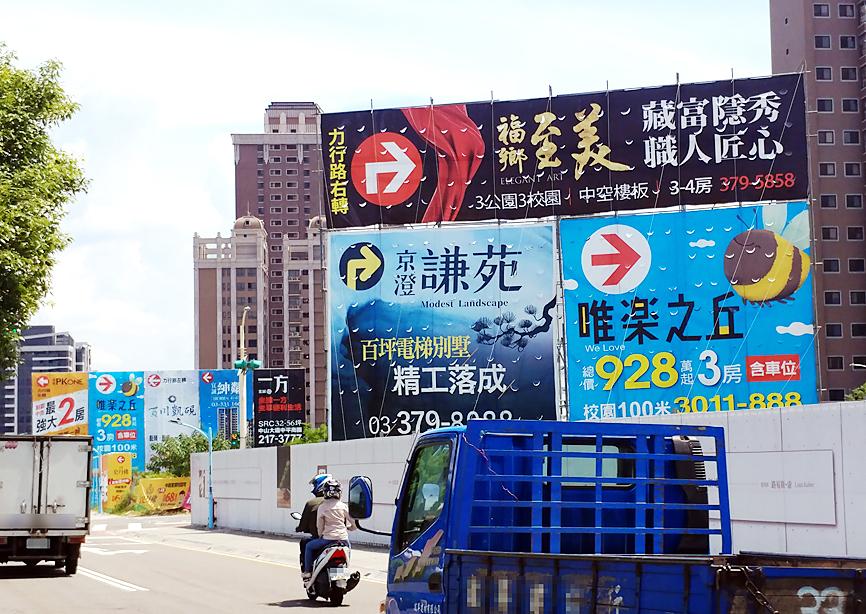The Financial Supervisory Commission (FSC) on Tuesday said that eight local banks should reduce the number of construction loans issued and enhance risk management, or they would be ordered to set aside higher loan-loss provisions.
The commission’s warning came after it last week announced that it would conduct a special examination of the top 10 mortgage lenders from this month to March, as part of the government’s efforts to rein in the overheated property market.
All local banks’ combined construction loans, indicative of the confidence of the construction sector, hit a record at NT$2.69 trillion (US$94.47 billion) as of the end of October, which accounted for 8.62 percent of their total lending, the highest ratio compared with a range of 7.13 to 9.12 percent from 2015 to last year, the commission said.

Photo: CNA
Among the nations’ 36 banks, construction loans made up more than 10 percent of eight banks’ outstanding lending, signally their concentration on construction loans, Banking Bureau Chief Secretary Phil Tong (童政彰) told a news conference in New Taipei City.
Although the eight lenders’ non-performing loan ratios for construction loans are not much higher than the average, their failure to diversify their lending portfolio would result in higher risks, Tong said, declining to name the banks.
The commission has asked the eight banks to submit improvement plans soon, and would monitor their performance on a monthly basis, Tong said.
It is not easy for banks to slash their construction loans in the short term, as such loans are usually long-term, but the commission expects banks to at least refrain from approving more new loans, he said.
If the eight banks fail to improve, they would need to set aside 2 percent loan-loss provisions on their construction loans, up from the current requirement of 1.5 percent, Tong said.

South Korea’s equity benchmark yesterday crossed a new milestone just a month after surpassing the once-unthinkable 5,000 mark as surging global memory demand powers the country’s biggest chipmakers. The KOSPI advanced as much as 2.6 percent to a record 6,123, with Samsung Electronics Co and SK Hynix Inc each gaining more than 2 percent. With the benchmark now up 45 percent this year, South Korea’s stock market capitalization has also moved past France’s, following last month’s overtaking of Germany’s. Long overlooked by foreign funds, despite being undervalued, South Korean stocks have now emerged as clear winners in the global market. The so-called “artificial intelligence

‘SEISMIC SHIFT’: The researcher forecast there would be about 1.1 billion mobile shipments this year, down from 1.26 billion the prior year and erasing years of gains The global smartphone market is expected to contract 12.9 percent this year due to the unprecedented memorychip shortage, marking “a crisis like no other,” researcher International Data Corp (IDC) said. The new forecast, a dramatic revision down from earlier estimates, gives the latest accounting of the ongoing memory crunch that is affecting every corner of the electronics industry. The demand for advanced memory to power artificial intelligence (AI) tasks has drained global supply until well into next year and jeopardizes the business model of many smartphone makers. IDC forecast about 1.1 billion mobile shipments this year, down from 1.26 billion the prior

People stand in a Pokemon store in Tokyo on Thursday. One of the world highest-grossing franchises is celebrated its 30th anniversary yesterday.

Chinese artificial intelligence (AI) start-up DeepSeek’s (深度求索) latest AI model, set to be released as soon as next week, was trained on Nvidia Corp’s most advanced AI chip, the Blackwell, a senior official of US President Donald Trump’s administration said on Monday, in what could represent a violation of US export controls. The US believes DeepSeek will remove the technical indicators that might reveal its use of American AI chips, the official said, adding that the Blackwells are likely clustered at its data center in Inner Mongolia, an autonomous region of China. The person declined to say how the US government received